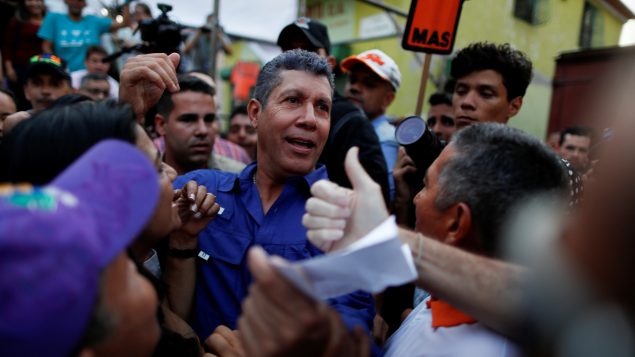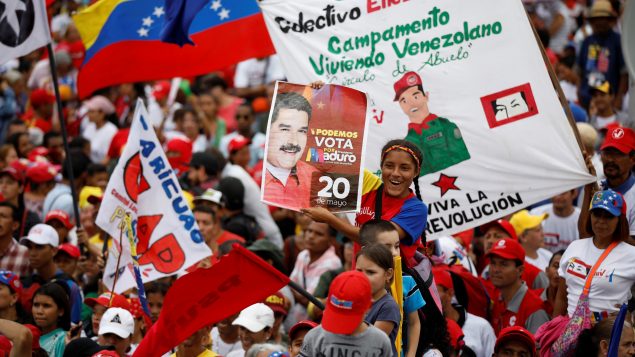While the Liberal government of Prime Minister Justin Trudeau continues to reject Sunday’s presidential election in Venezuela as a sham that “only serves to further entrench a dictatorial regime,” a group of Canadian electoral observers from labour, civil society and ecumenical groups hopes its presence will bolster the legitimacy of the controversial vote.
A delegation made up of seven representatives from Common Frontiers, Unifor, the Ontario Secondary School Teachers’ Federation, the Canadian Union of Postal Workers (CUPW), The United Church of Canada, and rabble.ca arrived in Caracas this week to observe the election.
The Canadian contingent is part of a larger international delegation of over 250 international observers from 60 countries around the world who have been invited by the Venezuelan labour organizations to witness the election.
“This election is different because it is going forward against opposition from the United States and its allies in the region,” said in a statement Jim Hodgson, program coordinator for Latin America and the Caribbean with the United Church. “But each country has the right to choose its leaders, free from foreign interference. Having observers present opens space for the reality on the ground to be heard.”

Venezuela’s President Nicolas Maduro delivers a speech to supporters during a campaign rally in Charallave, Venezuela May 15, 2018. (Carlos Garcia Rawlins/REUTERS)
Canada along with the U.S. has been at the forefront of the opposition to Venezuelan President Nicolas Maduro, who appears to be favoured to win Sunday’s vote.
Foreign Affairs Minister Chrystia Freeland has slammed the election as deeply flawed.
“Canada rejects the holding of an illegitimate presidential election that bars the opposition and a free press—and only serves to further entrench a dictatorial regime,” Freeland said Monday during a meeting of the Lima Group, a coalition of states opposed to Maduro’s socialist government.
The Liberal government has also decided to block about 5,000 Venezuelan nationals living in Canada from voting inside the Venezuelan embassy in Ottawa and consulates in Montreal, Toronto and Vancouver.
Raul Burbano, of Common Frontiers, an umbrella group of labour and civil society organizations, and the organizer of the delegation said the electoral system in Venezuela has a history of being fair, transparent and democratic.
Speaking on the phone from Caracas, Burbano said the situation he has witnessed on the ground differs sharply from how it’s being portrayed in the Western media.
“First, I heard there was a humanitarian crisis in Venezuela, there is no food, people are starving, and as I walk around Caracas, there is food everywhere,” Burbano said.
“There are definitely challenges in Venezuela, the inflation is extremely high, which obviously makes it a challenge for people but in terms of food and people eating there is no humanitarian crisis from that perspective.”
(click to listen to the full interview with Raul Burbano)
Listen
Venezuelan presidential candidate Javier Bertucci of the “Esperanza por el Cambio” party, delivers a speech to supporters during his closing campaign rally in Valencia, Venezuela May 16, 2018. (Carlos Jasso/REUTERS)
There is a festival atmosphere on the streets with loud music as supporters of Maduro gather for the last day of electoral activities, Burbano said.
There are campaign signs for Maduro and his main challengers, Henri Falcon and Javier Bertucci, Burbano said.
“The government of Venezuela is often referred to as a dictatorship and from what I see people on the streets and talking to people, there are people who support Maduro and there are people who oppose,” Burbano said. “It feels nothing like one would imagin a dictatorship.”
However, Venezuela’s main opposition alliance is boycotting the elections and the most prominent opposition figures — activist Leopoldo Lopez and two-time presidential contender Henrique Capriles — are banned from holding office.

Venezuelan presidential candidate Henri Falcon of the Avanzada Progresista party, greets supporters during a campaign rally in Caracas, Venezuela May 14, 2018. (Carlos Garcia Rawlins/REUTERS)
Burbano said he regrets Canada’s policy of disengaging with Venezuela and shunning the Maduro government.
The Canadian government policy of marginalizing the Maduro government and economic sanctions against Venezuela in the long run end up hurting ordinary people and contribute to a large extent to an already dire economic situation, Burbano said.
Venezuela’s infrastructure, for example, has become more visibly dilapidated since his last visit to the country in 2014, Burbano said.
“I believe that we should be working with the Venezuelan government to strengthen their democracy, to strengthen the economy and to support the participatory process and move away from the sanctions because historically sanctions have not benefited the people, if anything, they hurt people, the average Venezuelan,” Burbano said.







For reasons beyond our control, and for an undetermined period of time, our comment section is now closed. However, our social networks remain open to your contributions.